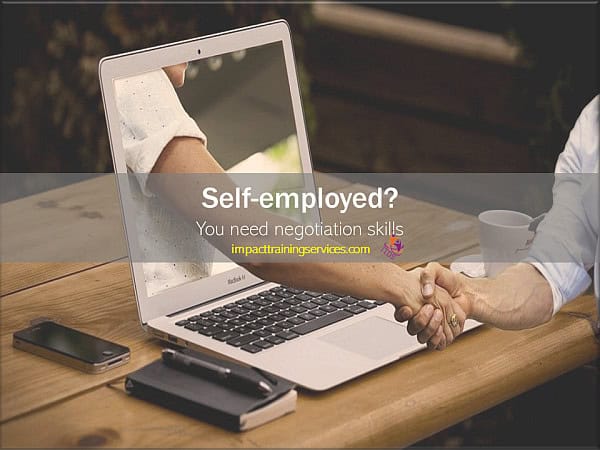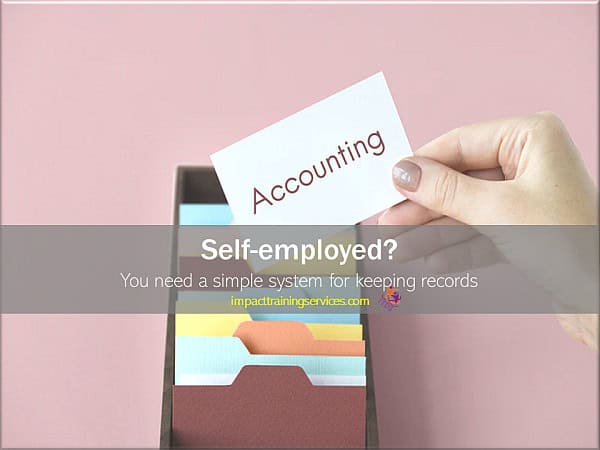
Last updated on February 21st, 2026 at 07:02 pm
Self-employed? 25 Realities You Need to Embrace for Success
- Home
- Self-employed? 25 Realities You Need to Embrace for Success

So…you’ve started that business. And whatever you call yourself, you’re finally self-employed.
Congratulations! you’ve have joined the approximately 582 million entrepreneurs around the globe who are their own boss.
But take it from me, there are some realities of being self-employed that they do not always write about in the business books or talk about in the business segments on television.
It seems you have to learn them by extensive trial and incredible error.
Just to be clear, a reality can be described as something that is constant or unchanging.
So when you embrace known realities, you can make them rules or even commandments for guiding your behaviour and your life will be far more successful than you imagine.
The same is true for your life as a self-employed person as well. If you can identify some key realities about being self-employed and embrace them and make them work for you, your journey to success will be shorter and sweeter.
So I want to shorten your self-employed journey to success. How? By sharing 25 self-employed realities with you. They do not make up a complete list but they are the combined experiences of my own journey and those of my clients. And they’re a good place for you to start…
They are in no particular order, so you will have to decide which are the most important to you.
So if you’re ready…
1. The best person to define “success” for you is you
When I was growing up, I learned early that success was measured by how much income you make. And if I could make much more money than those men I grew up with, who defined it by how many women they laid, I would be super successful.
But as I matured, and I made money, I begin to feel like something was missing. And I was not alone. One of my friends confessed to me that when he’d gotten a brand new top of the line Honda – the car he’d always wanted – he still felt empty.
And today’s definition of success is even more daunting. Your success is now defined by the dynamics of a global talent pool, made up of values you had no control over.
That’s why, as a self-employed person, it’s critically important to have your own definition of success.
When you do, you establish your own yardsticks to measure your success. You are no longer limited to just money. You can also choose from happiness, achievement, significance, legacy, etc, especially if you learn how to be successful.
So go ahead, define success on your own terms. Reimagine it any which way you want. You will know and be sure when you’re successful and you won’t need anybody’s permission to celebrate your success!
2. “Trying a thing” mindset prevents you from growing your business
Nothing annoys me more than self-employed persons and small business owners who are in business for several years and are still “trying a thing”! Stop it!
When you can claim “I’m just trying a thing” you don’t have to commit to growing your business. You can have a vague mission and you don’t have to worry about setting long term goals.
That’s not the way to succeed in business…
You have to approach growing and scaling your business with enthusiasm and excitement! You have to learn and understand all about the business of being in business and use this as the foundation for doing business.
After all, if you don’t love your business, who will?
3. Without a purpose, the passion soon dies
Why are you doing this work? What’s your purpose? What’s you big “WHY?”
When I started my business, I wanted to help small business owners grow their businesses by growing themselves. I wanted to do so with tools and resources that are specifically designed for them, and not scaled down versions of those used by big business.
When I feel lost or overwhelmed I always remind myself of my “BIG WHY”. Did I make money? Of course I did! But I made a difference too! And no amount of money feels as good as seeing a client achieve the result we planned.
I know the difference between when you have a good purpose for getting into business and when you’re just in for the money. I once started a business because a friend pointed out it was a good niche to get into. It was the most miserable 2 years of my adult life!
So be clear on your Big “WHY” even before you start. It’s hard to remain passionate and excited when you’re just doing business for the money.
4. Defining your niche is important to the self-employed
You have heard this before, haven’t you?
“You ask someone, “who are your customers?” and they smugly reply “everybody!” When it’s a potential client answering like this, I can’t go any further until I address this flawed perspective.
Especially when you’re self-employed, you have to identify your niche or market sector. If you don’t, how will you differentiate yourself in the marketplace? How will you develop relevant products and services for your customers?
What is a niche?
To me it’s a select group of people who have a need or needs which you are uniquely qualified to meet.
When you start a business, it can be a bit scary to think of serving only one niche or market sector. But try writing an ad for your business when your target group is “everybody” and you will soon see what I mean.
You simply can’t ever be everything to everybody so find your niche and serve it to the max!
5. Being over preoccupied with competition can ruin you

I know…I know… this sounds like ever so much foolishness and goes against everything you have heard.
Moreover, you can’t help peeping over you shoulder to see what the competition is doing or how close they are to you.
But when you put a lot of time, money and energy in trying to keep up with the competition or even burning them, you threaten the success of your business. And the stress…it can kill you.
So what do you do instead?
Focus on serving your customers in accordance with your mission and how you identified your niche. (see #4 above)
Then continuously compete with your last performance. In this way, your business will scale rapidly and you will be the standard that the “competition” will have to follow. It will also help you to put your business on the path to long term success.
So don’t be over preoccupied with the competition. Be aware but just get on with your business.
6. You cannot grow your business unless and until you grow yourself
I cannot stress this enough.
You cannot grow your $1m business into a $10m business with the same level of thinking, skills, learning that started the business in the first place. And yes, this means that you have to be constantly learning new things, both formally and mostly informally.
It follows then, that as a self-employed person, most of your learning will be self-directed and you will need to learn some things quickly.
Here’s an approach I use when I want to learn something quickly, which you can adopt it and apply as necessary.
First you decide what you need to learn. For me it is usually a something that once I learn it, it will have a meaningful impact on my performance and ultimately my bottom line.
Then you go in search of the learning material you want. You’re fortunate that we’re living in a world where you can find a fairly decent training programme, using the internet.
When you learn a concept, apply it to the business as soon as possible and ask for feedback. This will help you to learn fast. When you have mastered a concept, move on to the next and repeat the process. Before you know it yo would have mastered a new skill.
So don’t be afraid of learning what you need to learn to grow you and your business, just be sure to avoid information overload.
7. Competence in Public Speaking is a must
When I say this, some self-employed people think I’m only looking for business!
Listen…I only want your business if you want to give it to me, I’m past trying to sell meat to vegetarians. But I do know that if you run a business…any business you need public speaking skills.
When you have public speaking skills, you:
- increase your self-confidence
- improve your ability to sell yourself
- improve your ability to influence your audience (including customers and clients)
- resolve conflict with well-presented arguments
- experience a fast rise in business and or organisation life
- can speak before any audience anywhere
- control the conversation and by extension the outcomes
Why wouldn’t you want to acquire a skill with tall these benefits?
So get over your unnecessary fear of public speaking, and use public speaking to talk your way to the top.
8. You have to know how to sell yourself…in person and on paper
Of the thousands of entrepreneur and small business persons I have worked with, I have not found many who like talking about themselves and or their businesses.
This is especially true of those of us who offer services. I will readily admit, that used to be me (and sometimes could still be me). We surround ourselves with some wrong beliefs about marketing and look with envy at another competitor who is marketing the crap out of crap.
But when I learnt to pitch my services in person and back it up with an irresistible proposal, I noticed I was transforming prospects into clients at a faster and more consistent rate. And I was actually having fun.
So don’t be afraid of marketing your services. At the beginning as well as at the end of the day, no one knows your business better than you.
9. Confidence is your best skill…really
One of the key factors to success is confidence.
How can I make such a definite and bold statement? I have had the experience. Every time I step out in confidence, whatever I do is successful. When I am taken over by fear and doubt, my competence goes through the window and struggle and even failure is guaranteed.
Confidence is the thing that give you the courage to keep on keeping on. It’s how you get the most out of yourself in any moment. It’s how you get results without limits.
Do you need a business strategy? Yes! Do you need a business model? Most definitely!
But more that anything else, you need the confidence to make them work for you.
So learn how to build your confidence. And when you find what works for you, rinse and repeat it over and over so that you are constantly in a state of “confidence.”
10. The ability to negotiate will be your best friend

When I ask self-employed people what’s holding their business back, without hesitation, they declare “money!”
But I’m here to tell you that when you combine negotiation skills with the confidence I describe at #9 above, you can negotiate all the money you want. Within certain limits of course.
You need to understand that negotiation is not a contest or a conquest. According to Roger Fisher and William Ury in their International Bestseller, “Getting to Yes” negotiation is simply:
a basic means of getting what you want from others
In that simple definitions lies the reason why you need to acquire the skill. You see most of what you want will be controlled, owned, managed, etc by someone other than yourself. Skillful negotiations is the best and safest ways to tip the odds in your favour.
So if you need to, upgrade your negotiation skills at once.
11. Not knowing your business model is committing business suicide
I will not get over the fact any time soon that many, too many small business owners and self-employed persons, do not know their business model.
Do you know your business model? No, no…it’s not your business idea or your mission.
It’s simply clarity on how you plan to make money (profit) with your business idea. And you need to know this as you start your business, not as an afterthought somewhere down the road.
When you don’t know your business model, at best you’re making a big mistake. At worst, you’re flirting with business suicide.
Knowing your business model:
- signals to investors you’re serious and could be a good investment
- is a meaningful competitive advantage
- allows you to be financial over a longer period
- forces you to be focused
If you don’t know your business model, learning about business modelling will be of great help to you.
12. You have to get comfortable with money
Yeah…get comfortable with asking for it, with earning it and with managing it.
This is an uncomfortable area for most entrepreneurs and you are inclined to do a lot of funny things around money.
When I’m training, I make it a habit of including discussions about money, whatever my training topic. This is always an education for me.
Some of you fail to borrow the amount of money you need because you’re afraid you won’t be able to pay it back. Others don’t know what to do when clients or customers won’t pay up their debts. While some of you even point out that I use some really large amounts as examples to make my money points (lol!)
Just remember, money is the only objective way to verify your worth. Earning it makes you feel good about being in business and it gives you leverage for many things.
13. Self-employed does not = self-made
I listen to a lot of self-employed people who claim that they are self-made and they did it all by themselves. This makes me immediately think of all my mentors…all those willing people who helped me along my journey.
No man is an island is especially true when you’re growing a business or even when you’ve been in business for a while.
You may find it difficult to ask for help because we were taught that it makes us appear weak or not good enough. To me, it means you’re tough enough to commit to solving a problem without letting your ego get in your way.
So surround yourself with your Circle of Experience. It should be made up of carefully selected people who can support you, advise you and cuss you out if you need it. You will find help on how to do it here.
And when you’re comfortable with your circle, upscale your confidence by formally selecting a business mentor.
14. Without systems chaos rules in the life of the self-employed
You will not believe how many self-employed people mistake chaos for creativity.
You are perpetually late. You keep forgetting things. If you get something right today , there’s no guarantee you will get it right next time around.
And your excuse? “I am creative!”
You are NOT creative, your business and your life is in chaos!
How do you fix this? By developing systems for almost everything you have to do repeatedly.
How do you develop a system? At the risk of oversimplifying the process, here are some steps you can follow:
- make a list of the most important activities you do repeatedly
- write each one at the top of it’s own sheet of paper
- decide on the “correct” steps for each activity and record them on their sheet
- decide on the order for the steps in each activity. Use your experience
- Test the order of the steps until you satisfied they will give you the optimum results
- Now you have some systems you can rinse and repeat
And guess what? You can even have a system for success…
15. Your meticulous record keeping does not have to be complex

To the small, self-employed businessperson, record-keeping brings to mind a time-consuming degree of complexity. As one of my clients jokes, it is enough to send you straight under the bed to hide.
I know…but you need good records to monitor the progress of your business and keep it safe. For example you need records to help you:
- prevent theft or fraud
- manage your cash flow
- comply with statutory requirements
- pay your taxes
- make sound decisions
But while record-keeping can appear to be complex, you can satisfy your requirements with a simple system.
Start with 12 plastic envelope folders, one for each month of the year, appropriately labelled. Then just sort your bills, etc in date order and place them in the correct folder.
In this way, it becomes easy to retrieve data, do your taxes and even start a formal system when you’re ready.
16. Procrastination will be your enemy…and your friend
Yeah…we procrastinate in our businesses when we have to do something we think we’re not good at. Or…when we are faced with so many decisions we feel overwhelmed, so we do nothing. And then we feel terrible.
Almost every one of us procrastinates and it can take many forms. This short 2 minute video explains it so effectively and offer some solutions to overcome. Do take the time to watch it…
But procrastination can also be your friend. I have found that sometimes by not rushing to do something can often help you to find a solution or a method that’s just right for you.
Am I suggesting that you put off doing something all the while waiting for the right solution to come along? Not at all. I’m just saying that procrastination can sometimes be the friend, who shows you exactly what you need to learn.
17. Good habits leads to good business practices
Have you ever even paused and asked yourself ” what is a habit?”
If you did, I hope you came up with “a habit is that small thing you do or those small decisions you make, over and over, mostly unconsciously.”
The thing about habits is, we seem to allow those that are not good for us to take over our psyche.
If you’re self-employed, this means those like procrastination, not managing time, mistaking “activity’ for “productivity.” And then we panic when we can’t achieve our goals.
How much better it would be, if you could consciously develop a set of good habits and let them control you behind the scene!
You see, your habits, like your values, inform the world who you are and what they can expect from you.
So learn how to form good habits and let them control you. This will not only be good for you but it will show up in your business as well.
18. Action not “activities” will move you towards your goals
One of the things we’re good at, especially as self-employed business people, is fooling ourselves that we’re taking action, when all we’re doing is engaging in activities.
How do I know this? I’ve been there, done that. And I am not going back!
So what am I talking about? Let’s say you want to improve your marketing. What do you do?
If I imagine it correctly, it goes something like this:
You decide on the exact day in the month that’s right for learning about marketing. You tidy up your desk in preparation for your learning activity. You buy four books on marketing but you can’t make the decision on which one to read first.,
Five months later, nothing has happened to move your marketing forward. Why?
You were engaging in activities which made you feel like you were doing something as opposed to taking action which would move you rapidly towards your goal.
For example, action would be following the process for fast learning which I discussed in #6.
19. Things will get crazy and you will feel overwhelmed
It’s happened to me, it can happen to you.
You reach a point where suddenly (or gradually) you are overwhelmed. You don’t have enough time in any day. It seems like your hair’s on fire and your pants as well. What’s a poor self-employed person to do?
When this happens, as counterintuitive as it seems, slow down.
Yeah…take a deep breath…or two. Relax your mind. Go for a drive. Window shop or sit in a roadside café and watch the world go by. You will be renewed in body and spirit and you will find the time to get important things done. And where it was crazy you will now see calm.
But perhaps you’re wondering, “before I lost my your mojo, was there anything I could have done to prevent me from reaching there?” There is actually…
Once you have a good work routine in place, if you add a little patience, when you go of course, you will be back in control before you know it.
In other words, over the long run, the unglamorous habits of frequency and consistency, can not only reignite your creativity but they can save your sanity.
20. You will attract envy – recognize it when it comes

This was hard for me.
I am always so glad and happy for the good fortunes of my friends, family and everyone else, it was hard for me to grasp that any one of them would not feel the same for me.
What I did not realise, was that however much you’re struggling, however many nights passed that you didn’t sleep, you have taken the giant step to do what many are still talking about. Sadly, everybody will not be happy for you and your new business.
Fortunate for me, since I carefully built out my circle of experience over the years, there’s always someone there to interpret the subtle putdowns, the ill-informed psycho-analysis, the difficulty in recommending me publicly…the list is endless.
What envy did for me, was to teach me how to use assertiveness skills to be strong in every situation. And of course you can learn how to as well.
21. You are not separate from your business
Almost the first piece of advice you will receive as you set up your business is to keep it separate from your personal life.
On the face of it, it seems like good advice. But when your business is young and you’re self-employed, attempting this separation is a migraine in itself.
Depending on the nature of your business, you might be doing it from your home. For example, it’s highly unlikely that you will leave your laundry on the line if the rain is coming because you’re at “work”.
One of my young mentees told me that his mom had to go back to work in the family business pretty soon after his birth. So he spent his early years in the bottom drawer of her filing cabinet – until he could climb out!
A better approach is to manage the connection between you and your business, especially in the area of finances.
I teach my clients how to do this by showing them how to develop and manage a budget that recognises their unique small business owner status.
And you too can learn how to develop such a budget too.
22. Work/life balance will be out of your reach…at first
The term “work/life balance is easy enough to define.
So when most of you hear the term work/life balance, it creates this picture of equal balance between your work and your “other” life. Really?
When you work for yourself, your work is your life…or the other way around. There will be times when you will be working 19 hours a day in the business and others when you will have a full 10 hours of family fun and relaxation.
The balance comes in making your choices and enjoying them. And the real benefit is in being ruthless in some of your choices.
23. Age is not a barrier to becoming self-employed
If you’re old enough to start a business, you’re old enough. You have no idea how both younger and older people, agonise about if to start a business or not, because of their age.
Look, if you’re past 50, be guided by the wisdom of your years. Most research indicate that older entrepreneurs have acquired business and life experience, knowledge and skills, social networks and resources that better equip them for success.
In addition, they tend to have better social skills, they can control their emotions are better able to regulate their emotions, than younger entrepreneurs.
Moreover, there is a worldwide boom in older entrepreneurs.
On the other hand, if you’re under 30, be buoyed by the enthusiasm of youth. You have a bigger appetite for risk and a degree of confidence that might even border on cockiness.
But this won’t be nearly enough for your success. You also need:
- A sound and trusted business mentor who has done or is doing what you want to do
- A network or community of advisors and like-minded people, especially if you’re working from home
- A willingness to acquire the skills that will help you to grow your business
Whatever your age, don’t “die with your music inside of you.” Claim your freedom. Start that business!
24. An open mind is your best source of new ideas
I can hear her now, my friend who was often quick to declare “That’s not me!’’
Furthermore, she was equally quick to tell me “that’s not you!” Good thing I saw what she could not…her closed-mindedness was just a means of covering her deep-rooted fears.
But if you’re going to grow and rapidly scale your business, you need to have an open mind.
So what does it mean to be have an open mind?
It means you welcome new ideas, perspectives, arguments and information that you don’t necessarily agree with. It really is a positive characteristic and it shows you are capable of thinking critically and rationally.
When your mind is closed, you often shut out the very thing you need to move you forward. Worst yet, you are often saying “no” to your genius.
In addition, having an open mind is one of the fastest ways to be able to step out of your comfort zone. This is really a necessary step for any self-employed person to grow and scale their business.
25. Leadership matters to the self-employed
I know you get that. After all, I’m sure you intend to grow your business into a meaningful entity, staffed with productive people and confidently lead by you.
But how do you get there? For the most part, that’s up to you. But there’s a step in there that I suggest you don’t miss out. That’s self-leadership. But what is self-leadership?
To me, self-leadership is:
when you continuously develop who you are, know where you’re going and be willing to constantly influence your “inner game” and direct your behaviour to get there.
Being able to lead yourself determines the values you choose and how you choose them. It determines how you show up and if your word has meaning or not. It means that if you want your business to grow and change, you first have to grow and change. You must be willing to throw out old beliefs and approaches and learn new ones.
In their book “Getting It Right When It Matters Most: Self-Leadership for Work and Life”, Tony Gambill and Scott Carbonara introduce the SOAR Self-leadership model. The four phases of the model are Self, Outlook, Action, and Reflection (SOAR) and you can access a practical summary of the model right here.
So go on, take the first step into leadership…it’s self-leadership.
Your next “self-employed” reality step…
It’s simple, really. Give yourself a reality check.
Read all 25 of my “realities “and honestly ask yourself: Which of these have I not thought of myself? And which of these do I need to wake up to fast?
Then use your answer to go in search of the missing help or support to rapidly scale and grow your business.
To your super success…



